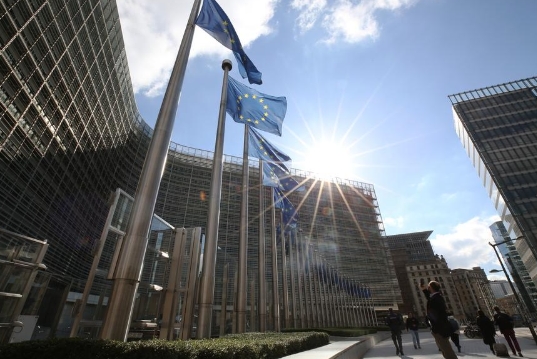EU's tariffs on Chinese EVs a "foolish" decision, says German auto expert

This photo taken on Oct. 4, 2024 shows the European Commission building in Brussels, Belgium. (Xinhua/Zhao Dingzhe)
The EU is turning the European Green Deal into a "black deal" by slapping tariffs on Chinese EVs, says a renowned German automotive expert.
The EU's decision to impose tariffs on Chinese electric vehicles (EVs) is "foolish" and "out of touch with reality," a German auto expert has said.
The EU is turning the European Green Deal into a "black deal" by slapping tariffs on Chinese EVs, which will slow down the transformation toward electric mobility and hurt the interests of the German auto industry, Ferdinand Dudenhoeffer, a renowned German automotive expert, told Xinhua in a recent interview.
It is creating obstacles to the development of EVs, which play a crucial role in carbon neutrality, said Dudenhoeffer, director of the Center for Automotive Research (CAR).
The climate target set by China paved the way for the development of EVs, which are indispensable for carbon neutrality, he said, adding that the auto industry in China has benefitted from the "smart strategy" and advanced at a fast pace.
"China is the country of electric cars and therefore the country of the car of the future... Without China, global electric mobility would look very bleak. China plays the key role in the global transition to EVs," said the expert.
However, the development of EVs is suffering a setback in the EU, especially in Germany, due to weaker demand. Registrations of electric vehicles in Germany dropped sharply by 32 percent during the first eight months this year, according to the government's statistical office Destatis.
Dudenhoeffer expressed strong concerns about the impact of European policies on EVs, particularly those produced in collaboration with Chinese manufacturers.
With new tariffs on EVs made in China, electric vehicles will be "artificially" made more expensive, which will further dampen demand and decelerate the development of charging infrastructure and the battery industry.
He mentioned electric models like "Smart," built by a joint venture between Mercedes-Benz and China's Zhejiang Geely Holding Group, and BMW Mini, produced with China's Great Wall Motor.
"Imagine that the taxes paid by companies like BMW and Mercedes-Benz are being used to harm these businesses from Brussels. It's astonishing how the decision of tariffs appears out of touch with reality," he said.
Dudenhoeffer considers collaboration as the "golden path" for German and Chinese automakers who can pool their expertise in areas like interior materials, chassis, batteries, software, AI and autonomous driving.
"Collaboration is always essential for the development of the automotive industry, as mutual benefits can be realized through shared knowledge and innovation in the rapidly changing automotive landscape," said the auto expert.
According to Dudenhoeffer, the competition from Chinese automakers in the EU not only prevents European automakers from becoming complacent but also creates opportunities for collaboration.
"Competition fosters new forms of collaboration," he said, "No company excels in every aspect. The competition with China allows us to exchange ideas with Chinese firms and combine the best components into a cohesive whole. This can lead to cooperation or joint ventures...there are many possibilities."
Dudenhoeffer believes that competition will also lead to more affordable EVs. "We can act more swiftly against climate change, and it will require less effort to purchase an electric car. It's a situation where everyone benefits," he added.
Editor:伏娅敏
